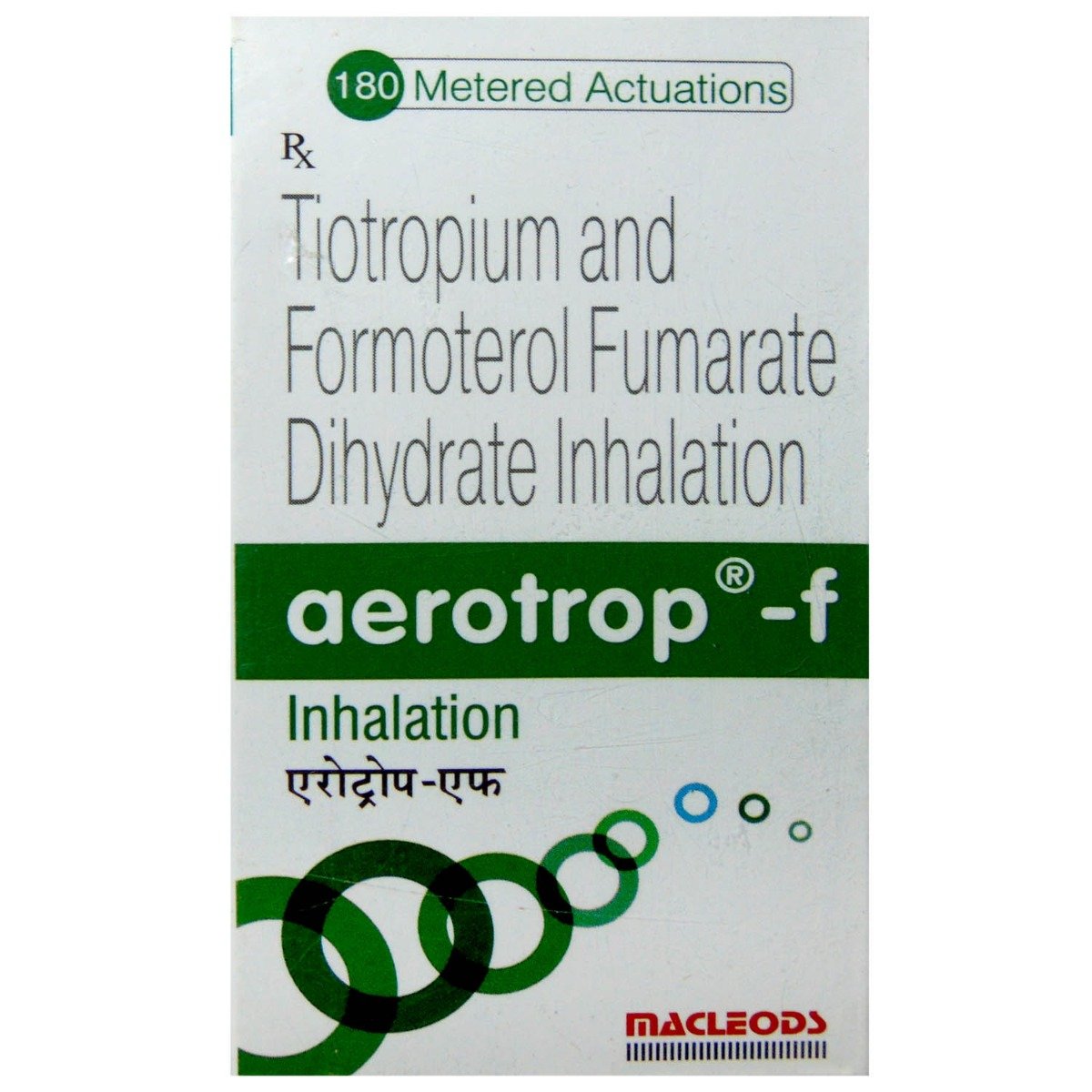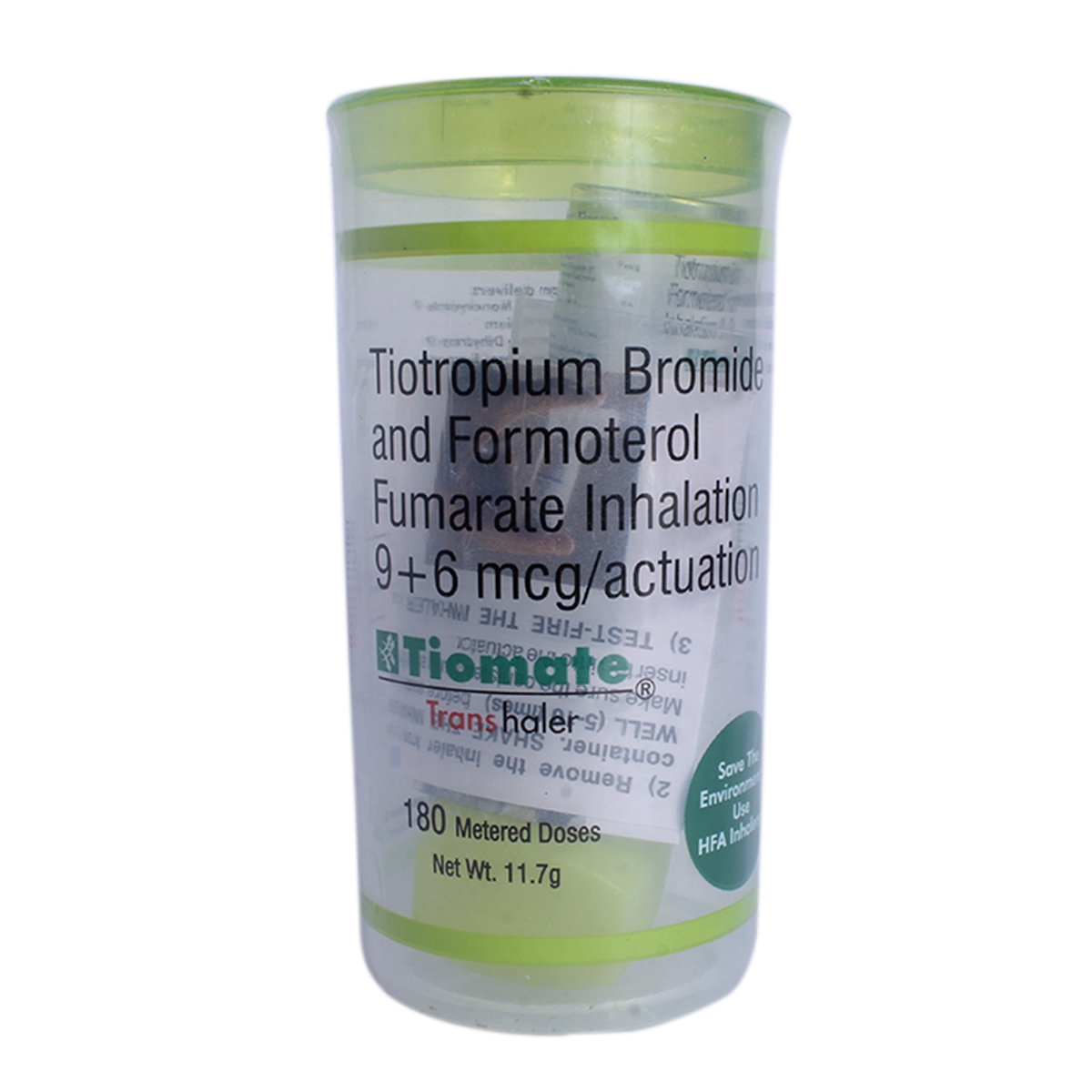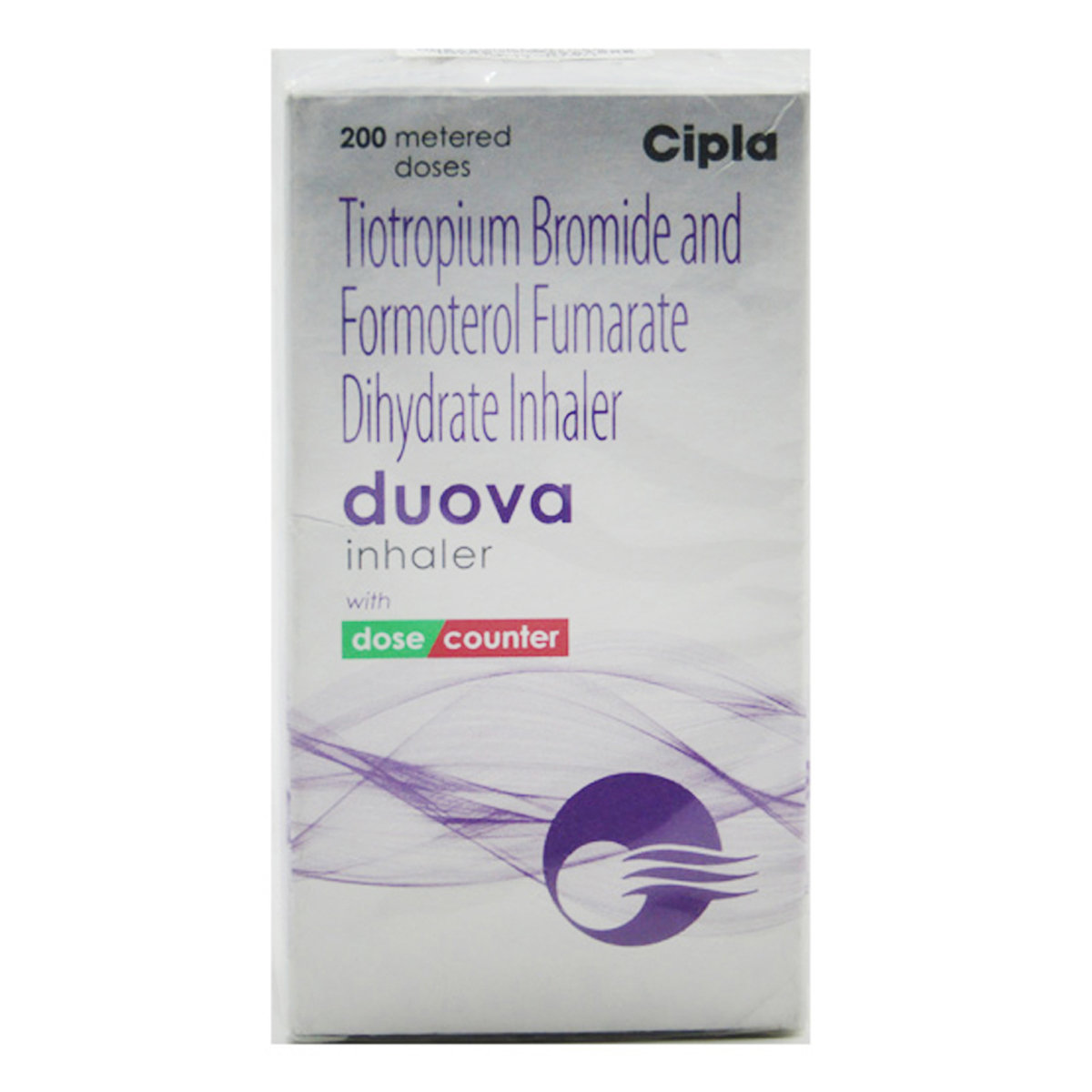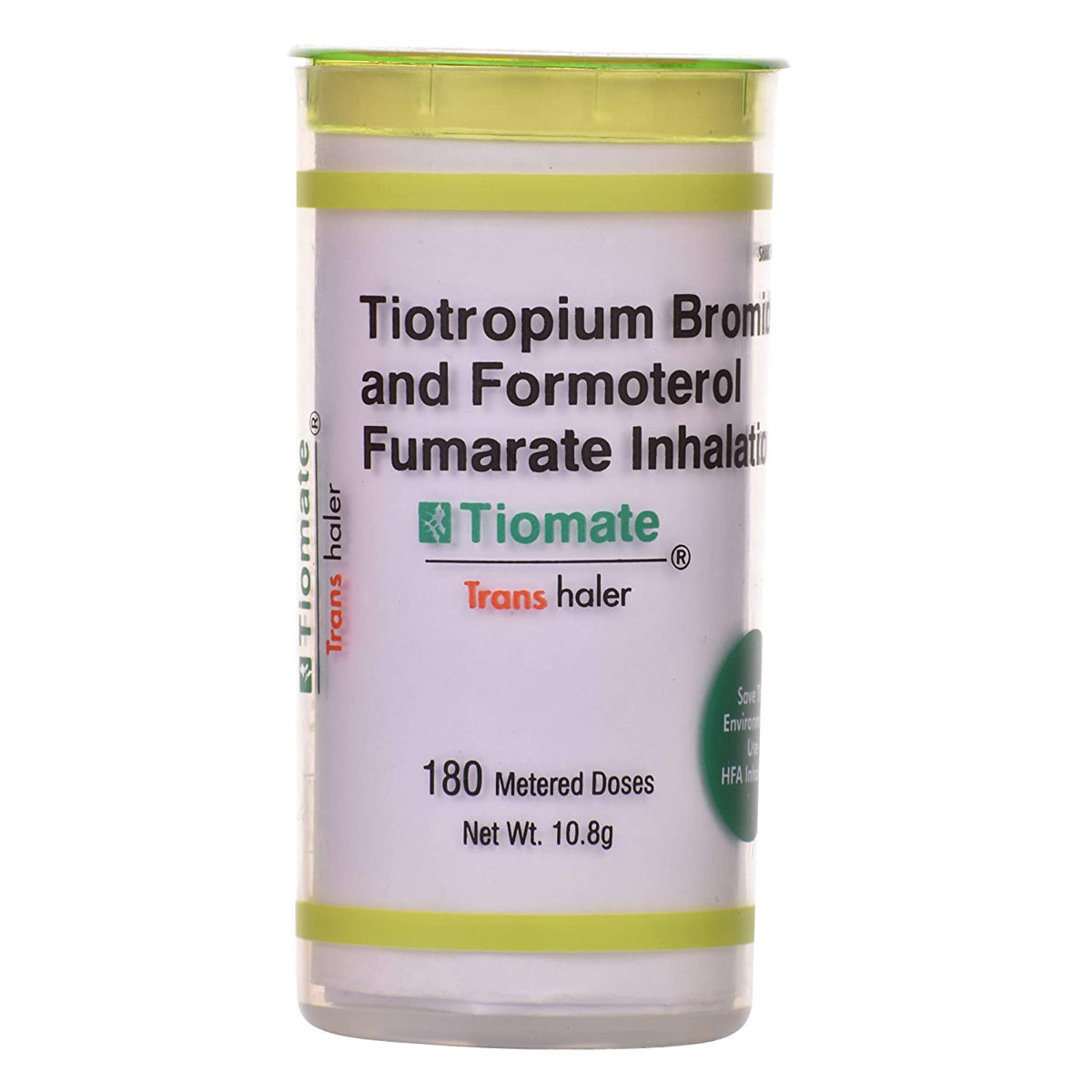Duova Inhaler 200 mdi
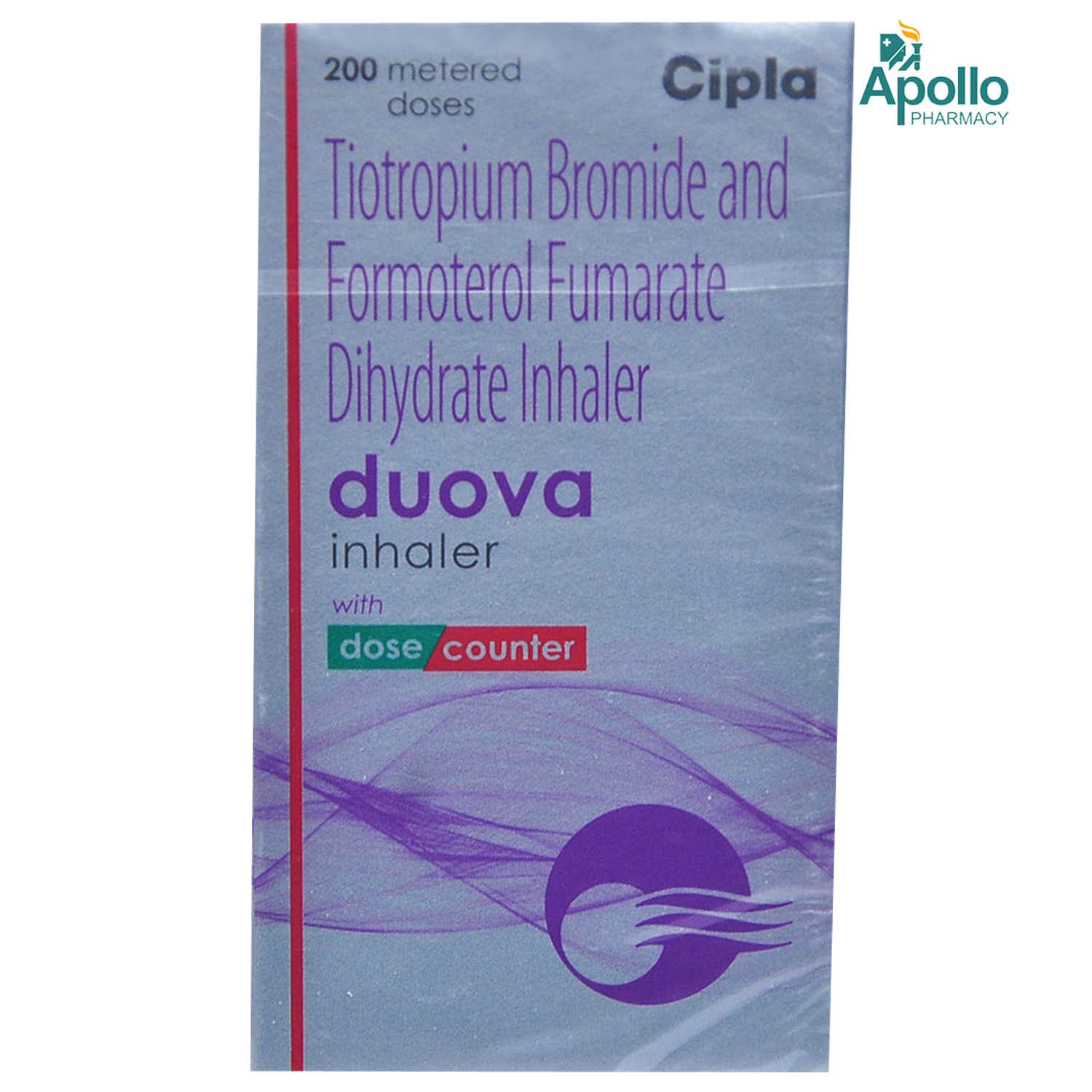
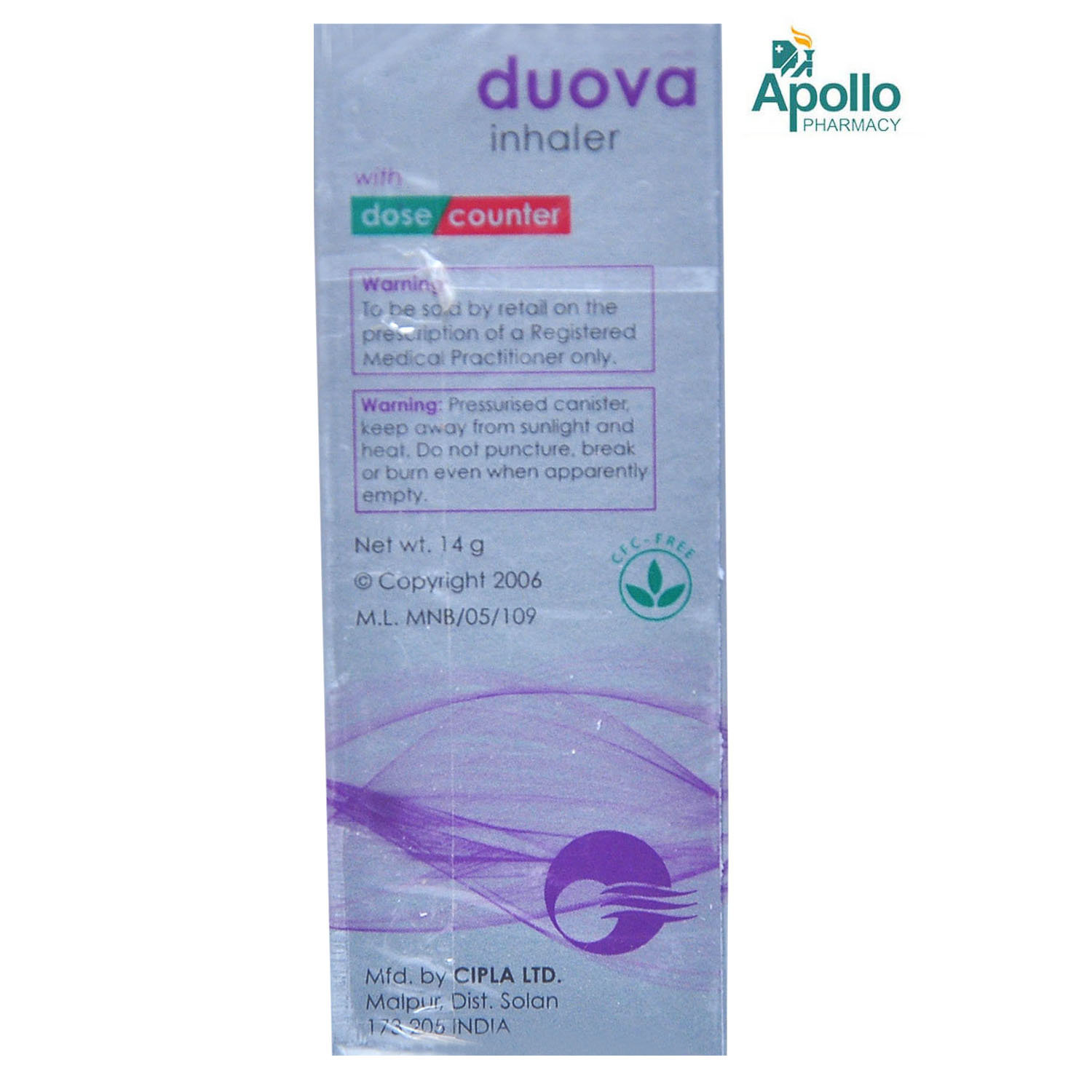
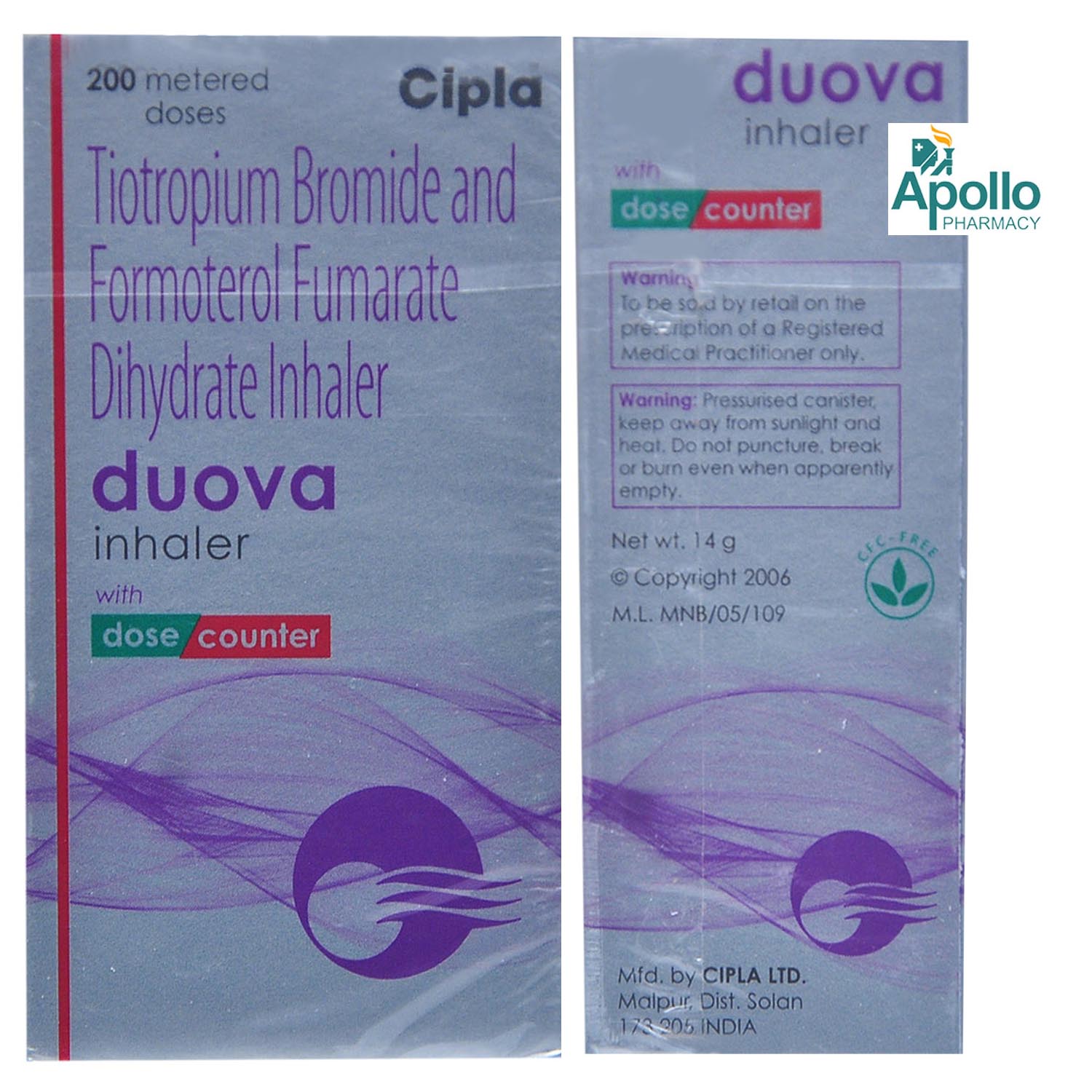
MRP ₹869.5
(Inclusive of all Taxes)
₹130.4 Cashback (15%)
know your delivery time
Provide Delivery Location
Composition :
Manufacturer/Marketer :
Consume Type :
Expires on or after :
Return Policy :

Secure Payment

Trusted by 8 Crore Indians

Genuine Products
Therapeutic Class
Country of origin
Manufacturer/Marketer address
FAQs
Disclaimer
Alcohol
Safe if prescribed
Avoid drinking alcohol while taking this medicine, as it can worsen your side effects.
Pregnancy
Consult your doctor
Duova Inhaler 200 mdi is not recommended to use during pregnancy since it may have harmful effects on the unborn baby. Please consult your doctor if you are planning to conceive or are already pregnant before starting Duova Inhaler 200 mdi.
Breast Feeding
Consult your doctor
It is not known if this drug passes into breast milk. Consult your doctor before breastfeeding.
Driving
Safe if prescribed
Do not drive or operate machinery if you experience drowsiness and increased/uneven heart rate while using Duova Inhaler 200 mdi. This may affect your ability to drive. Seek medical attention if the symptoms persist longer.
Liver
Consult your doctor
Duova Inhaler 200 mdi should be used with caution in patients with liver diseases. Let your doctor know if you have any history of liver diseases or hepatic impairment. Your doctor will weigh the benefits and potential risks before prescribing Duova Inhaler 200 mdi.
Kidney
Consult your doctor
Duova Inhaler 200 mdi should be used with caution in patients with kidney diseases. Let your doctor know if you have any history of kidney diseases. Your doctor will weigh the benefits and potential risks before prescribing Duova Inhaler 200 mdi.
Children
Safe if prescribed
Duova Inhaler 200 mdi is not recommended for use in children less than five years of age. The dose may have to be adjusted by your doctor depending on the condition of the child's disease and age.
Product Substitutes
About Duova Inhaler 200 mdi
Duova Inhaler 200 mdi is a respiratory medication primarily used to treat and prevent asthma and chronic obstructive pulmonary diseases (COPD) like bronchitis (inflammation of the lining of your bronchial tubes) and emphysema (shortness of breath). Asthma is a chronic (long-term) respiratory condition in which airways narrow, swell and produce extra mucus, leading to difficulty breathing. COPD is a group of lung diseases that causes obstructed airflow from the lungs.
Duova Inhaler 200 mdi is a combination of Formoterol (bronchodilator) and Tiotropium (anticholinergic). Formoterol relaxes the muscles in the airways and increases airflow to the lungs. Formoterol makes breathing easier by widening the airways. Tiotropium works by blocking the receptors for acetylcholine released in the cholinergic nerve endings in the airways. Duova Inhaler 200 mdi relaxes and widens the airway's openings, making it easier for the air to get in and out of the lungs. Thereby, it helps to prevent asthma attacks.
Your doctor will advise on how often you need to use Duova Inhaler 200 mdi based on your medical condition. The common side effects of Duova Inhaler 200 mdi include nausea, vomiting, respiratory tract infection, headache, sore throat, cough, bone, muscle or joint pain, increased heart rate, chills, tiredness, and noisy breathing. Most of these side effects of Duova Inhaler 200 mdi do not require medical attention and gradually resolve over time. However, if the side effects are persistent, reach out to your doctor.
Do not use Duova Inhaler 200 mdi to treat sudden severe symptoms of asthma or as a rescue inhaler. Please check with your doctor if you are pregnant, breastfeeding, or taking other prescribed or non-prescribed medicines. Brief your medical history if you have heart, liver, or kidney diseases, high blood pressure, hypokalaemia (low potassium levels in the blood), aneurysm (swelling of an artery), pheochromocytoma (adrenal gland tumour), hyperadrenocorticism (high levels of cortisol), eye disorders like cataract and glaucoma, chickenpox or measles, immune system problem, seizure (fits), osteoporosis (weak and brittle bones) or diabetes.
Uses of Duova Inhaler 200 mdi
Medicinal Benefits Mweb
Key Benefits
Duova Inhaler 200 mdi is used to treat and prevent respiratory disorders like asthma and chronic obstructive pulmonary disease (COPD). Duova Inhaler 200 mdi improves pulmonary function and effectively treats and prevents the worsening of emphysema (shortness of breath) and chronic bronchitis (inflammation of the lining of your bronchial tubes). Duova Inhaler 200 mdi contains Formoterol (bronchodilator) and Tiotropium (anticholinergic). Formoterol is a long-acting β₂ agonist and bronchodilator. It relaxes the muscles in the airways and increases airflow to the lungs. It makes breathing easier by widening the airways. Tiotropium works by blocking the receptors for acetylcholine which are released in the cholinergic nerve endings in the airways.
Directions for Use
Side Effects of Duova Inhaler 200 mdi
- Nausea
- Vomiting
- Respiratory tract infection
- Headache
- Sore throat
- Cough
- Dry mouth
- Constipation
Drug Warnings
Special precautions should be taken in patients with a fungal, bacterial, parasitic, or viral infection and tuberculosis since nasal or inhaled corticosteroids can cause secondary infections. Duova Inhaler 200 mdi can cause a rise in blood glucose levels. Hence monitor your blood glucose levels regularly and inform your doctor if you already have diabetes before using Duova Inhaler 200 mdi. Duova Inhaler 200 mdi may affect the unborn baby during pregnancy. Please let your doctor know if you plan to become pregnant or are already pregnant, or if you are a lactating mother. Duova Inhaler 200 mdi is not recommended for children below five years of age.
Drug-Drug Interactions
Drug-Drug Interactions
Login/Sign Up
Co-administration of labetalol and Duova Inhaler 200 mdi together could decrease the effects of both medications.
How to manage the interaction:
Although taking Labetalol and Duova Inhaler 200 mdi together can result in an interaction, it can be taken if a doctor has prescribed it. However, if you experience any unusual symptoms contact a doctor immediately. Do not stop using any medications without talking to a doctor.
Using Duova Inhaler 200 mdi and Carvedilol together may reduce the effects of both medications.
How to manage the interaction:
Although there is an interaction between Duova Inhaler 200 mdi and Carvedilol, they can be taken together if prescribed by a doctor. Do not discontinue any medications without consulting a doctor.
Using Duova Inhaler 200 mdi together with metipranolol can reduce the effects of both medications.
How to manage the interaction:
Although there is an interaction between Duova Inhaler 200 mdi and metipranolol, they can be taken together if prescribed by your doctor. However, if you experience any unusual symptoms contact your doctor immediately. Do not stop using any medications without first talking to your doctor.
Taking ribociclib together with Duova Inhaler 200 mdi can increase the risk of an irregular heart rhythm
How to manage the interaction:
Co-administration of Duova Inhaler 200 mdi with Ribociclib can possibly result in an interaction, but it can be taken if your doctor has advised it. However, if you experience sudden dizziness, lightheadedness, fainting, or shortness of breath, contact your doctor right away. Do not stop using any medications without first talking to your doctor.
Using epinephrine together with Duova Inhaler 200 mdi may increase the risk of irregular heart rhythm.
How to manage the interaction:
Although taking Duova Inhaler 200 mdi and Epinephrine together can cause an interaction, it can be taken if your doctor has suggested it. However, if you experience any unusual symptoms contact your doctor immediately. Do not stop using any medications without first talking to your doctor.
Using Duova Inhaler 200 mdi with pindolol together could decrease the effects of both medications.
How to manage the interaction:
Although there is an interaction between Duova Inhaler 200 mdi and Pindolol, they can be taken together if prescribed by your doctor. However, if you experience any unusual symptoms contact your doctor immediately. Do not stop using any medications without first talking to your doctor.
Taking carteolol with Duova Inhaler 200 mdi can reduce the effects of both drugs.
How to manage the interaction:
Although there is an interaction between Carteolol and Duova Inhaler 200 mdi, they can be taken together if prescribed by a doctor. Do not discontinue any medications without consulting a doctor.
Taking timolol with Duova Inhaler 200 mdi could reduce the benefits of both medications because they have opposite effects on the body.
How to manage the interaction:
Although taking Duova Inhaler 200 mdi and timolol together can possibly result in an interaction, it can be taken if your doctor has advised it. However, if you experience any unusual symptoms, contact your doctor immediately. Do not stop using any medications without talking to your doctor.
Taking nadolol with Duova Inhaler 200 mdi together could decrease the effects of both medications.
How to manage the interaction:
There may be a possibility of interaction between Duova Inhaler 200 mdi and Nadolol, but it can be taken if prescribed by a doctor. However, if you experience any unusual symptoms contact your doctor immediately. Do not stop using any medications without first talking to your doctor.
Using Duova Inhaler 200 mdi together with penbutolol can reduce the effect of both medications.
How to manage the interaction:
There may be a possibility of interaction between Penbutolol and Duova Inhaler 200 mdi, but it can be taken if prescribed by a doctor. However, if you experience any unusual symptoms contact your doctor immediately. Do not stop using any medications without first talking to your doctor.
Drug-Food Interactions
Drug-Food Interactions
Login/Sign Up
Drug-Diseases Interactions
Drug-Diseases Interactions
Login/Sign Up
Drug-Drug Interactions Checker List
- BECLOMETASONE
- MOMETASONE
- BUDESONIDE
- IPRATROPIUM
- SALMETEROL
- VILANTEROL
- ALBUTEROL
- METOPROLOL
- SOTALOL
Habit Forming
Special Advise
- It is advised to undergo a blood examination to keep a check on your potassium levels since Duova Inhaler 200 mdi can cause low potassium levels in the blood (hypokalaemia).
- Regularly monitor your blood sugar levels while using Duova Inhaler 200 mdi since bronchodilators like Formoterol can cause low blood glucose levels.
- Consult your diabetologist if you have diabetes before using Duova Inhaler 200 mdi so that your insulin or other diabetic medication can be adjusted accordingly to maintain your blood sugar levels.
Diet & Lifestyle Advise
- Know your triggers like allergens, such as pollen, dust, and food items that make your asthma severe.
- Quit smoking and avoid passive smoking. Smoking also reduces the effectiveness of the medicine.
- Eat a healthy diet and exercise regularly to strengthen your breathing muscles and boost your immune system.
- Learning breathing exercises will help you move more air in and out of your lungs.
All Substitutes & Brand Comparisons
RX
Out of StockAirtio F Inhaler 150 mdi
Glenmark Pharmaceuticals Ltd
₹86
(₹0.52/ 1MDI)
86% CHEAPERRX
Out of StockIbitrop Nexhaler 240 mdi
Indiabulls Pharmaceuticals Pvt Ltd
₹560
(₹2.1/ 1MDI)
46% CHEAPERRX
Aerotrop F Inhalaer 180 mdi
Jubilant Lifesciences Ltd
₹510
(₹2.49/ 1MDI)
36% CHEAPER

Have a query?
Buy best Respiratory System products by
Cipla Ltd
Lupin Ltd
Glenmark Pharmaceuticals Ltd
Sun Pharmaceutical Industries Ltd
Alkem Laboratories Ltd
Macleods Pharmaceuticals Ltd
Mankind Pharma Pvt Ltd
Zydus Healthcare Ltd
Leeford Healthcare Ltd
Dr Reddy's Laboratories Ltd
Zydus Cadila
Abbott India Ltd
Intas Pharmaceuticals Ltd
Alembic Pharmaceuticals Ltd
German Remedies Ltd
Centaur Pharmaceuticals Pvt Ltd
Ipca Laboratories Ltd
Aristo Pharmaceuticals Pvt Ltd
Pristine Pearl Pharma Pvt Ltd
Wockhardt Ltd
GlaxoSmithKline Pharmaceuticals Ltd
Zuventus Healthcare Ltd
Koye Pharmaceuticals Pvt Ltd
Micro Labs Ltd
Blue Cross Laboratories Pvt Ltd
Medishri Healthcare Pvt Ltd
Med Manor Organics Pvt Ltd
Indiabulls Pharmaceuticals Pvt Ltd
Adonis Laboratories Pvt Ltd
FDC Ltd
Fourrts India Laboratories Pvt Ltd
Tablets India Ltd
J B Chemicals & Pharmaceuticals Ltd
Shreya Life Sciences Pvt Ltd
Divine Savior Pvt Ltd
Indoco Remedies Ltd
Seagull Pharmaceutical Pvt Ltd
Yash Pharma Laboratories Pvt Ltd
Torque Pharmaceuticals Pvt Ltd
Uniza Healthcare Llp
Wings Pharmacuticals Pvt Ltd
Biological E Ltd
Corona Remedies Pvt Ltd
Icarus Health Care Pvt Ltd
Steris Healthcare
Apex Laboratories Pvt Ltd
Geno Pharmaceuticals Pvt Ltd
Navil Laboratories Pvt Ltd
Precept Pharma
Aar Ess Remedies Pvt Ltd
La Renon Healthcare Pvt Ltd
Torrent Pharmaceuticals Ltd
Astra Zeneca Pharma India Ltd
Biochem Pharmaceutical Industries Ltd
Comed Chemicals Ltd
Entod Pharmaceuticals Ltd
Franco Indian Pharmaceuticals Pvt Ltd
Healthgate Pvt Ltd
Intra Life Pvt Ltd
Megma Healthcare Pvt Ltd
Pfizer Ltd
RPG Life Sciences Ltd
Unipark Biotech Pvt Ltd
Votary Laboratories (India) Ltd
Wanbury Ltd
Brinton Pharmaceuticals Ltd
Dolvis Bio Pharma Pvt Ltd
Eisen Pharmaceutical Co Pvt Ltd
Group Pharmaceuticals Ltd
Knoll Pharmaceuticals Ltd
Morepen Laboratories Ltd
Panacea Biotec Ltd
Prevego Healthcare & Research Pvt Ltd
Rnd Laboratories Pvt Ltd
Sanatra Healthcare Ltd
Skn Organics Pvt Ltd
Stedman Pharmaceuticals Pvt Ltd
Thuyam Life Pvt Ltd
Timon Pharmaceuticals Pvt Ltd
Aglowmed Pharmaceuticals Ltd
Ajanta Pharma Ltd
Alniche Life Sciences Pvt Ltd
Bio Warriors Pharmaceucticals Pvt Ltd
Biochemix Health Care Pvt Ltd
Cadila Healthcare Ltd
Cadila Pharmaceuticals Ltd
Caplet India Pvt Ltd
Chemo Healthcare Pvt Ltd
Delcure Life Sciences Ltd
East West Pharma India Pvt Ltd
Elder Pharmaceuticals Ltd
Embiotic Laboratories (P) Ltd
Emcee Pharmaceuticals (P) Ltd
Foregen Healthcare Ltd
Hetero Healthcare Pvt Ltd
Incite Pharmaceuticals
Iva Healthcare Pvt Ltd
Kepler Healthcare Pvt Ltd
Kristal Pharmaceuticals
Lincoln Pharmaceuticals Ltd
Frequently Bought Together
Customers Also Bought



